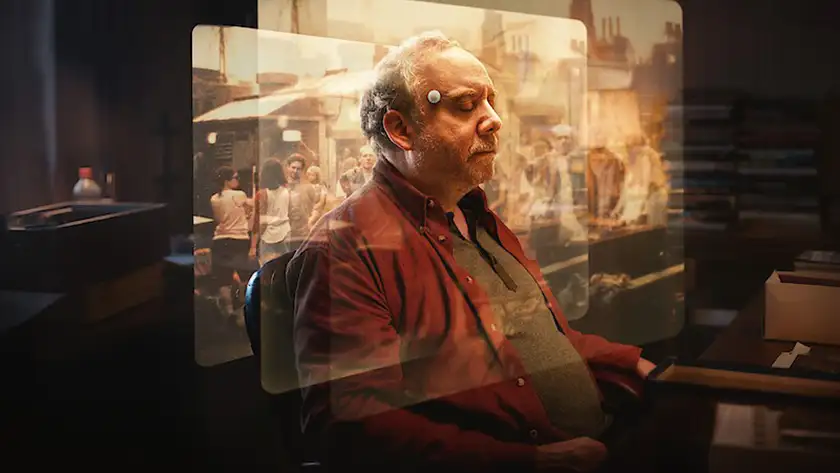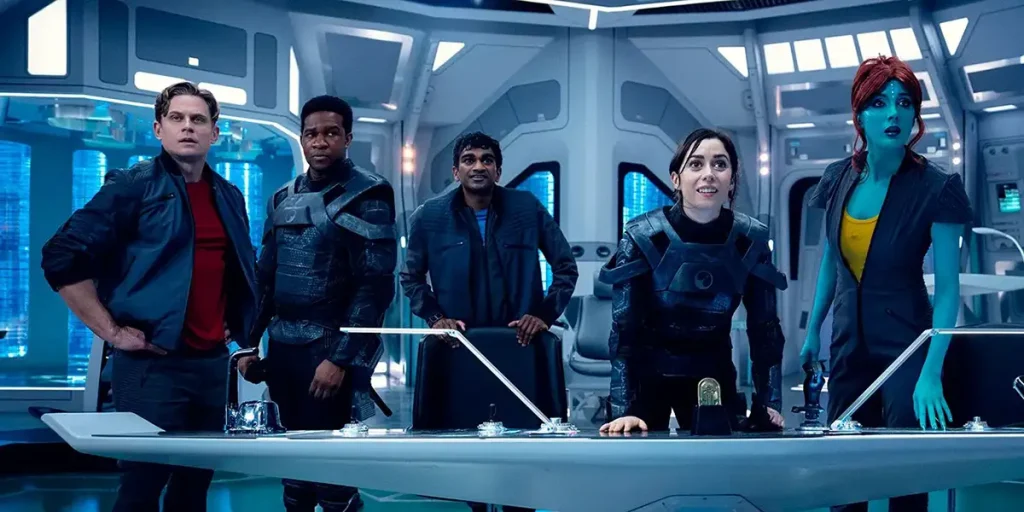Black Mirror season 7 is one of the show’s most creative and ambitious in a long time, held back by only a couple of underwhelming stories.
Showrunner: Charlie Brooker
Directors: Toby Haynes, Haolu Wang, David Slade, Ally Pankiw, Chris Barrett & Luke Taylor
Genre: Sci-Fi, Dystopian, Mystery, Psychological Thriller
Number of Episodes: 6
Release Date: April 10, 2025
Where to Watch: Globally on Netflix
Over the years, Netflix’s Black Mirror has been a project filled with highs and lows. While the first few seasons are often credited with housing some of the most engaging and innovative sci-fi stories in television history, many audiences have been put off by later seasons’ often underwhelming and derivative attempts to recapture that same magic. However, with its recently released season 7, Black Mirror goes back to its roots and provides six bold, unique stories that feel incredibly timely in their exploration of technology and humanity.
Not every episode is a hit, but the season as a whole is the perfect place for jaded audiences to give Black Mirror a second chance.
There’s a huge variety of stories in Black Mirror season 7 that are all very different both thematically and in their quality, which makes summarising the season as a whole almost impossible. As such, we’ll take a look at each episode individually, breaking down what works (and what doesn’t) in this unique anthology show.
“Common People” – Episode 1
Season 7 of Black Mirror starts off strong with “Common People”, an episode that feels like it could have been pulled straight from the show’s earliest seasons. The story follows the happily married Amanda (Rashida Jones) and Mike (Chris O’Dowd), whose lives are turned upside-down when Amanda becomes fatally ill. Luckily, a private company offers Mike the chance to bring his wife back through their new experimental surgery – but when the price of keeping Amanda alive continues to rise, Mike struggles to justify her existence.
“Common People” feels like an extremely ironic episode for Netflix to release, given its unflattering commentary on “premium tier” subscription services, but its message about capitalist greed and the flaws of consumerism lands very effectively. Jones and O’Dowd have excellent chemistry that immediately sells the audience on their romance, and Charlie Brooker’s screenplay has that signature Black Mirror pessimism that keeps audiences thinking about its ideas long after the credits have rolled.

“Bête Noire” – Episode 2
Following the powerful yet familiar “Common People” is “Bête Noire”, an episode that conversely feels very experimental and unusual for Black Mirror. While it has the same eerie storytelling that audiences have come to expect from the show, much of this episode’s narrative doesn’t focus on technology (at least superficially) at all. “Bête Noire” tells the story of Maria (Siena Kelly) and Verity (Rosy McEwen), two women who know each other from school, who find themselves working at the same culinary design company. But when everybody in Maria’s life starts disagreeing with her, she begins to suspect that Verity has something to do with it.
“Bête Noire” is a clear highlight of Black Mirror season 7, primarily because it’s simply a lot more fun than most of the show’s recent adventures. It’s much less of a commentary on the dangers of technology, which has been done countless times in this show, and more of a character-driven story about jealousy, revenge, and justice. It’s also tailor-made for rewatches, as the final-act twist reframes everything that came before it.
“Hotel Reverie” – Episode 3
There are a couple of underwhelming entries in Black Mirror’s latest season, and “Hotel Reverie” is the first. But it’s a huge shame, because this episode easily has the most potential of them all. The story follows an actress named Brandy (Issa Rae) who stars in a remake of a black-and-white Hollywood classic film called “Hotel Reverie”. But upon arriving at the studio, she learns that her movie will be filmed using an AI technology that places her in a simulation of the original film, where she develops a complex relationship with one of its stars.
“Hotel Reverie” is a very topical story about the use of artificial intelligence in the film industry, but it’s also a captivating romance that uses its charming Hollywood aesthetic to explore how love can transcend humanity. Unfortunately, the story is far too long and spends way too much time explaining the intricacies of this technology while its central romance is reduced to a series of brief montages. It’s very reminiscent of Black Mirror’s previous story “San Junipero” from season 3 – if that narrative had immediately given away its twist and taken place almost entirely in the real world.
“Plaything” – Episode 4
“Plaything” is the second of Black Mirror season 7’s misfires, although it certainly has some redeeming qualities. The episode is a quasi-sequel to 2018’s Bandersnatch, a feature-length movie in the Black Mirror universe that allowed viewers to choose their own path through the story. This episode follows a man named Cameron (Peter Capaldi) who’s arrested for the murder of an unidentified man; much of the story is told in flashbacks as he explains his complex relationship with a digitally conscious video game.
This episode certainly has some good ideas, but its non-linear format only distracts from the true message that it’s trying to present: a biting interrogation of how human lives are valued in comparison to different forms of existence. There’s no reason for this story to be told through narration and flashbacks, when a cut-and-dry thriller about Cameron’s work on the video game back in the ‘80s would have been even more effective. Regardless, Peter Capaldi’s eccentric performance is worth the price of admission alone.

“Eulogy” – Episode 5
Without a doubt, “Eulogy” is the highlight of Black Mirror season 7. A heartbreaking, sentimental odyssey through the power of memory and grief, bolstered by an unbelievable performance from Paul Giamatti. One half A Christmas Carol and one half Eternal Sunshine of the Spotless Mind, this story follows Giamatti’s protagonist Phillip as he’s requested to travel through his memories and provide one anecdote from an old relationship to be shown at his ex-girlfriend’s funeral.
“Eulogy” is the most emotional episode of Black Mirror in years, exploring how our memories define us as humans – and importantly, how they can’t be replicated by technology. Unlike “Plaything”, the non-linear storytelling really works in this episode because it’s woven into the fabric of the story: as Phillip travels through his memories and reflects upon events from the past, they directly impact his life in the present. This is what Black Mirror has always been about, and it’s the show’s best outing in years.
“USS Callister: Into Infinity” – Episode 6
As an anthology show, Black Mirror’s episodes are always standalone stories that can be watched in any order. There are certain Easter eggs that connect them within the same universe, but the episodes have always been independent – until now. Black Mirror’s first sequel episode is a follow-up to the fourth season’s “USS Callister”, and it’s a huge success. This story is a clear highlight of season 7; the story picks up directly where the previous episode ended – with a digital clone of tech programmer Nanette (Cristin Milioti) and her crew fighting to survive in CEO Robert Daly’s (Jesse Plemons) expansive video game world.
What’s so great about “USS Callister: Into Infinity” is that it doesn’t feel forced; if there was ever going to be a sequel to any Black Mirror episode, this is the perfect choice. Although the original wrapped up in a satisfying way, this sequel finds plenty of room to develop the characters even more and continue raising the stakes. It goes even further with its commentary on human “clones” and artificial lifeforms, bridging the gap between the virtual and digital worlds with some Severance-esque commentary on what it means to be a “real person” and how we should value different kinds of life. It’s an excellent episode, and if this does end up being Black Mirror’s final season, a very fitting conclusion.
Black Mirror Season 7 Overall Review
Black Mirror has never been a show that values consistency. It’s a playground for experimentation, and when the ideas are as bold and ambitious as this, it’s not surprising when there are a couple of misfires in a six-episode season. However, Black Mirror season 7 does an excellent job of blending the highbrow, tech-focused stories with more grounded, human narratives to keep each episode feeling fresh and distinct.
Perhaps more than any other season, Black Mirror’s latest outing feels like one that’s specifically been made with long-time fans in mind. Whether that’s due to the show’s first-ever sequel episode, or the tangential connections to Bandersnatch in “Plaything”, there’s something about season 7 that feels like a celebration of the show as a whole. After a handful of fairly underwhelming seasons, this is a perfect way to get old audiences back on board.
Black Mirror Season 7: Series Plot & Recap
Synopsis:
Ranging from retro murder mysteries to reality-bending character dramas, Black Mirror returns with another series of dystopian stories that place modern society under a murky microscope.
Pros:
- Unfiltered, ambitious storytelling that’s filled with inventive ideas
- Rewarding connections to previous episodes in the show’s history
- Gorgeous cinematography and an increased budget that’s evident through special effects
Cons:
- Certain episodes feel slightly too familiar and don’t go far enough in their thematic exploration
- The lengthy runtimes are often unjustified, particularly those in excess of 80 minutes.
Black Mirror Season 7 is now available to watch globally on Netflix. Read our review of season 6 of Black Mirror!

